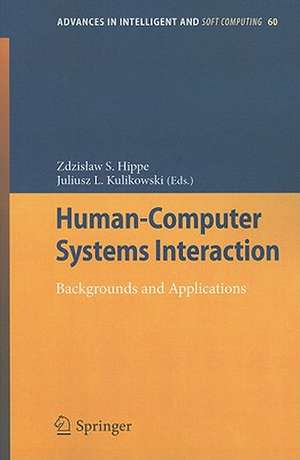Human-Computer Systems Interaction: Backgrounds and Applications: Advances in Intelligent and Soft Computing, cartea 60
Editat de Zdzislaw S. Hippe, Juliusz Lech Kulikowskien Limba Engleză Paperback – 6 oct 2009
Din seria Advances in Intelligent and Soft Computing
- 18%
 Preț: 2813.03 lei
Preț: 2813.03 lei - 20%
 Preț: 1273.74 lei
Preț: 1273.74 lei - 18%
 Preț: 1214.72 lei
Preț: 1214.72 lei - 18%
 Preț: 1221.07 lei
Preț: 1221.07 lei - 20%
 Preț: 653.06 lei
Preț: 653.06 lei - 20%
 Preț: 1919.02 lei
Preț: 1919.02 lei - 20%
 Preț: 984.04 lei
Preț: 984.04 lei - 20%
 Preț: 1746.09 lei
Preț: 1746.09 lei - 20%
 Preț: 1906.99 lei
Preț: 1906.99 lei - 20%
 Preț: 1763.75 lei
Preț: 1763.75 lei - 20%
 Preț: 1278.68 lei
Preț: 1278.68 lei - 20%
 Preț: 1926.61 lei
Preț: 1926.61 lei - 20%
 Preț: 3183.20 lei
Preț: 3183.20 lei - 20%
 Preț: 334.86 lei
Preț: 334.86 lei - 20%
 Preț: 1916.55 lei
Preț: 1916.55 lei - 20%
 Preț: 981.25 lei
Preț: 981.25 lei - 20%
 Preț: 1934.70 lei
Preț: 1934.70 lei - 20%
 Preț: 1932.07 lei
Preț: 1932.07 lei - 20%
 Preț: 979.71 lei
Preț: 979.71 lei - 20%
 Preț: 1920.84 lei
Preț: 1920.84 lei - 15%
 Preț: 647.92 lei
Preț: 647.92 lei - 20%
 Preț: 985.86 lei
Preț: 985.86 lei - 20%
 Preț: 641.16 lei
Preț: 641.16 lei - 20%
 Preț: 3174.14 lei
Preț: 3174.14 lei - 20%
 Preț: 1293.71 lei
Preț: 1293.71 lei - 20%
 Preț: 2890.01 lei
Preț: 2890.01 lei - 20%
 Preț: 1924.15 lei
Preț: 1924.15 lei - 20%
 Preț: 1901.71 lei
Preț: 1901.71 lei - 20%
 Preț: 1934.70 lei
Preț: 1934.70 lei - 20%
 Preț: 1918.04 lei
Preț: 1918.04 lei - 20%
 Preț: 1919.02 lei
Preț: 1919.02 lei - 20%
 Preț: 419.25 lei
Preț: 419.25 lei - 20%
 Preț: 1310.68 lei
Preț: 1310.68 lei - 20%
 Preț: 1931.42 lei
Preț: 1931.42 lei - 20%
 Preț: 1941.96 lei
Preț: 1941.96 lei - 20%
 Preț: 2217.66 lei
Preț: 2217.66 lei - 20%
 Preț: 1297.17 lei
Preț: 1297.17 lei - 20%
 Preț: 1295.71 lei
Preț: 1295.71 lei - 20%
 Preț: 1306.07 lei
Preț: 1306.07 lei - 20%
 Preț: 1277.06 lei
Preț: 1277.06 lei - 20%
 Preț: 1909.64 lei
Preț: 1909.64 lei - 20%
 Preț: 668.07 lei
Preț: 668.07 lei
Preț: 1236.19 lei
Preț vechi: 1507.55 lei
-18% Nou
Puncte Express: 1854
Preț estimativ în valută:
236.62€ • 257.11$ • 198.89£
236.62€ • 257.11$ • 198.89£
Carte tipărită la comandă
Livrare economică 22 aprilie-06 mai
Preluare comenzi: 021 569.72.76
Specificații
ISBN-13: 9783642032011
ISBN-10: 364203201X
Pagini: 650
Ilustrații: XIV, 570 p. 291 illus., 139 illus. in color.
Dimensiuni: 155 x 235 x 35 mm
Greutate: 0.98 kg
Ediția:2010
Editura: Springer Berlin, Heidelberg
Colecția Springer
Seria Advances in Intelligent and Soft Computing
Locul publicării:Berlin, Heidelberg, Germany
ISBN-10: 364203201X
Pagini: 650
Ilustrații: XIV, 570 p. 291 illus., 139 illus. in color.
Dimensiuni: 155 x 235 x 35 mm
Greutate: 0.98 kg
Ediția:2010
Editura: Springer Berlin, Heidelberg
Colecția Springer
Seria Advances in Intelligent and Soft Computing
Locul publicării:Berlin, Heidelberg, Germany
Public țintă
ResearchCuprins
General Problems of H-CSI.- From Research on the Decision-Making in Ill-Structured Situation Control and the Problem of Risks.- Emulating the Perceptual System of the Brain for the Purpose of Sensor Fusion.- Knowledge Acquisition in Conceptual Ontological Artificial Intelligence System.- Problems of Knowledge Representation in Computer-Assisted Decision Making Systems.- A Dialogue-Based Interaction System for Human-Computer Interfaces.- Consistency-Based vs. Similarity-Based Prediction Using Extensions of Information Systems – An Experimental Study.- Image Annotation Based on Semantic Rules.- Disabled Persons Helping and Medical H-CSI Applications.- A Prototype Mobility and Navigation Tele-Assistance System for Visually Disabled.- Eye-Mouse for Disabled.- Eye-Blink Controlled Human-Computer Interface for the Disabled.- HMM-Based System for Recognizing Gestures in Image Sequences and Its Application in Continuous Gesture Recognition.- Machine Learning of Melanocytic Skin Lesion Images.- A Preliminary Attempt to Validation of Glasgow Outcome Scale for Describing Severe Brain Damages.- Segmentation of Anatomical Structure by Using a Local Classifier Derived from Neighborhood Information.- An Application of Detection Function for the Eye Blinking Detection.- Self-directed Training in an Evidence-Based Medicine Experiment.- Psychological and Linguistic Aspects of H-CSI.- Emotion Recognition from Facial Expression Using Neural Networks.- Emotion Eliciting and Decision Making by Psychodynamic Appraisal Mechanism.- Positing a Growth-Centric Approach in Empathic Ambient Human-System Interaction.- Toward Daydreaming Machines.- Eliminate People’s Expressive Preference in the Mood of Fuzzy Linguistics.- VoiceXML Platform for Minority Languages.- Polish Speech Processing ExpertSystem Incorporated into the EDA Tool.- A Web-Oriented Java3D Talking Head.- A VR-Based Visualization Framework for Effective Information Perception and Cognition.- Robots and Training Systems.- From Research on the Virtual Reality Installation.- High-Level Hierarchical Semantic Processing Framework for Smart Sensor Networks.- A Human-System Interaction Framework and Algorithm for UbiComp-Based Smart Home.- Biologically Reasoned Point-of-Interest Image Compression for Mobile Robots.- Surgical Training System with a Novel Approach to Human-Computer Interaction.- Kinematics Analysis and Design of 3 DOF Medical Parallel Robots.- Graphical Human-Machine Interface for QB Systems.- Visualization of Two Parameters in a Three-Dimensional Environment.- Various H-CSI Applications.- An Evaluation Tool for End-User Computing Competency in an Organizational Computing Environment.- Enterprsise Ontology for Knowledge-Based System.- Constructing Ensemble-Based Classifiers Based on Feature Transformation: Application in Hand Recognition.- A New and Improved Skin Detection Method Using Mixed Color Space.- A Formal Model for Supporting the Adaptive Access to Virtual Museums.- 3D Molecular Interactive Modeling.- Shape Recognition of Film Sequence with Application of Sobel Filter and Backpropagation Neural Network.- Dynamic Changes of Population Size in Trai ning of Artificial Neural Networks.- New Approach to Diagnostics of DC Machines by Sound Recognition Using Linear Predictive Coding.- Diagnosis Based on Fuzzy IF-THEN Rules and Genetic Algorithms.- Necessary Optimality Conditions for Fractional Bio-economic Systems: The Problem of Optimal Harvest Rate.
Textul de pe ultima copertă
For the last decades, as the computer technology has been developing, the importance of human-computer systems interaction problems was growing. This is not only because the computer systems performance characteristics have been im-proved but also due to the growing number of computer users and of their expectations about general computer systems capabilities as universal tools for human work and life facilitation. The early technological problems of man-computer information exchange – which led to a progress in computer programming languages and input/output devices construction – have been step by step dominated by the more general ones of human interaction with-and-through computer systems, shortly denoted as H-CSI problems. The interest of scientists and of any sort specialists to the H-CSI problems is very high as it follows from an increasing number of scientific conferences and publications devoted to these topics. The present book contains selected papers concerning various aspects of H-CSI. They have been grouped into five Parts:
I. General H-CSI problems (7 papers),
II. Disabled persons helping and medical H-CSI applications (9 papers),
III. Psychological and linguistic H-CSI aspects (9 papers),
IV. Robots and training systems (8 papers),
V. Various H-CSI applications (11 papers).
I. General H-CSI problems (7 papers),
II. Disabled persons helping and medical H-CSI applications (9 papers),
III. Psychological and linguistic H-CSI aspects (9 papers),
IV. Robots and training systems (8 papers),
V. Various H-CSI applications (11 papers).












